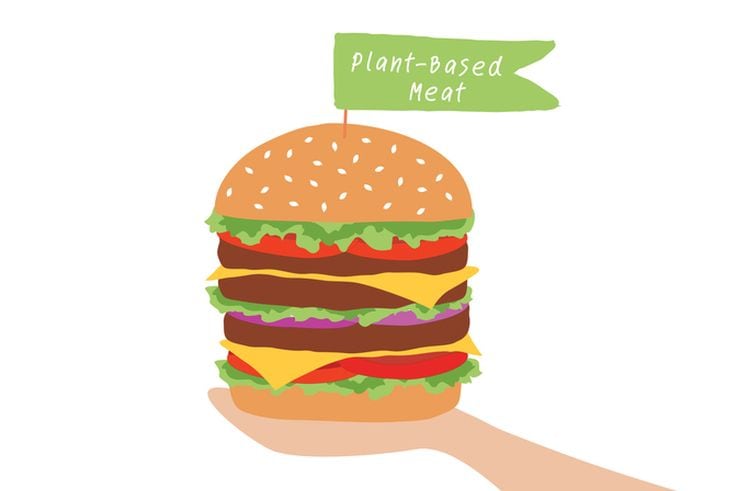“The tide has really shifted on this push for more and more people in the world to transition into a plant-forward diet,” Bethany Gomez, managing director at Brightfield Group, told FoodNavigator-USA.
“That’s kind of a concerning trend for the longevity of the category indicating it may be reaching its cap in terms of how much penetration it can expect out of the market overall.”
Evergi surveyed 5,210 US consumers over the age of 21 and asked them which plant-based products they purchased in the past three months and compared those responses to the previous quarter.
“What’s we’ve seen for this quarter in particular is a lot of these plant-based categories down quarter over quarter in terms of overall [reported] consumer adoption usage, and that was really across the board,” said Gomez.
The steepest declines were seen in plant-based creamers, which were down -25% quarter over quarter in terms of reported consumer purchases (although SPINS data for the 52 weeks to July 10 shows sales of plant-based creamers were up 25.8% YoY in measured US retail channels), followed by plant-based fish alternatives (-17%), plant-based sausages (-17%), plant-based yogurt (-9%), and plant-based cheese (-8%).
In plant-based meat/burgers, consumers reported a -7% decline (-6% for plant-based chicken alternatives).
Areas that saw slight growth included plant-based bacon (+1%) and plant-based frozen meals or bowls (+5%).
‘It’s a really pivotal moment for the industry’
To understand the shifts in consumer adoption, Evergi looked at the differences between consumer segments, dividing respondents into three types: vegan, vegetarian, and plant-forward (defined as consumers who ensure plants and vegetables are a large part of their diet but also eat meat and other animal products).
Plant-forward dieters (representing a larger total addressable market), who are also purchasing meat and dairy products, showed the largest declines in plant-based purchases and greater increases in animal products including red meat and chicken, according to Evergi.
Nearly half (49%) of plant-forward dieters reported eating more meat products in the past three months.
“Many of them still believe in the benefits of a plant-based diet but because of the economic stress that they’re seeing they’re trading down to cheaper alternatives and they’re not as willing to invest in plant-based products,” said Gomez.
“It's a really pivotal moment for the industry and those consumers (plant-forward dieters) are going to be the ones to kind of make or break the category. And right now their loyalty is wavering.”
'They’re not as willing to invest in plant-based products'
Gomez also noted that consumers considered “fast adopters” to new trends (those who rushed out to try the Impossible Burger at Burger King, for example) are leaving the plant-based segment in greater numbers.
“We are seeing a lot of those declines come from the previously fast adopters that are not as committed to all things natural, and all things plant-based or vegan,” she said.
And even if inflation moderates, it may be difficult for the plant-based segment to recapture some of its lost audience and momentum, noted Gomez.
“Once you settle into those new habits it’s harder to break them even when more discretionary income becomes available. Once the wind comes out of the sails of a new category it can be hard to get that back,” she said.
Bright spot with most loyal plant-based consumers
But it’s not all doom and gloom, highlighted Gomez, who said that the most loyal customers to the plant-based segment are still sticking around.
“Among the trendy enthusiasts, plant-based consumption is actually up. So those who are on the most cutting edge of trends, those consumers are continuing to purchase plant-based products,” she said.
Among those ‘trendy enthusiast’ consumers, purchases of plant-based meat/burgers are up 6%, plant-based chicken is up 19%, plant-based sausages (+19%), plant-based bacon (+12%), and plant-based cheese (+31%).
'Curve of disillusionment'
Gomez noted that it’s important to remember there are peaks and valleys to every major trend or emerging category.
“You have a little bit of a natural fallout after that peak frenzy happens in what’s referred to as ‘The Curve of Disillusionment’,” she said.
“What we’re seeing is that flattening of the trend and not as many new consumers coming into the category and there’s some shaking out happening as well.”
Environmental opportunity
As environmental issues weigh more heavily on consumers’ minds, their food choices will become more sustainably focused creating an opportunity for plant-based products across categories to shine, noted Gomez.
“Where they [plant-based categories] still have a lot of opportunity to shine is in their benefits from an environmental standpoint. A lot of the data is showing that those underlying beliefs that were driving people to eat plant-based meat to begin with are still holding. They still believe that plant-based products are more beneficial for their health and more beneficial for the planet,” said Gomez.
“There is still a lot of room for the category if they can recapture some of that sustainability messaging and positioning.”




